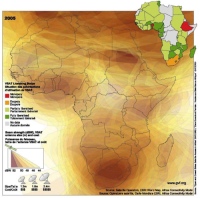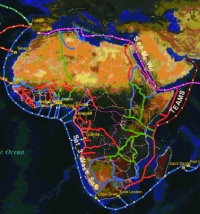One of the great drags on African economic development in general, and on one-to-one computing in education and OLPC in particular, is the staggering cost of bandwidth. Until recently, for example, the Fantsuam Foundation in Nigeria was paying $1700 a month for a 128Kbps satellite link, whereas I pay $35/month for 6 Mbps. (Fantsuam switched to terrestrial wireless last year.)
In a completely Free Market, such price disparities should not exist, which tells you how free the communications market has been where Africa is concerned. In fact, existing satellite systems have acted just as economic theory says an oligopoly will, to keep prices up. In effect, we have an informal cartel.
My focus today on this obstacle is not to ignore the cost of travel (San Francisco to Accra, Ghana: $1250, vs. SFO-Athens, Greece $515), or the astounding level of corruption and mismanagement in many countries in Africa, or the wars, oppressions, epidemics, and so on. But we must leave those for another day. Today we have news about fiber.
Russell Southwood's Balancing Act e-mail newsletter reports on the Satcom 09 conference, the global meeting of the satellite communications industry. The headline is "Satcom 09: Africa's satellite providers find themselves looking at a less rosy future", which is to say, a competitive future in which they don't get to overcharge an entire continent any more.
The specific event that triggered this prediction was the announcement of yet another fiber optic cable project for Africa. Fifteen years ago, in 1994, the Africa One project announced the laying of the first optical fibre in the ocean all around Africa, a project which in fact was delayed for years after that, and finally canceled.
Eventually Africa got the SAT3/WASC cable down its west coast from Europe to South Africa, and then a line from South Africa across the Indian Ocean as far as Malaysia. Planning for the EASSY cable down the east coast took several years more, but cable laying began in 2008, and is expected to be finished by the middle of 2010. But none of this activity has yet brought prices down. The organizers of SAT3/WASC have simply joined the existing informal cartel,
Now, however, we have half a dozen international fiber projects for Africa, and fiber within countries scheduled to mushroom. (Map) Some of the new projects have announced competitive price cuts in advance, and prices for existing satellite connections are beginning to drop seriously.
It is too soon to say how far prices will fall, that is, whether they will begin to have some relationship with the cost of providing service rather than what the market will bear. O3B, at any rate, is offering satellite rates as cheap as common fiber rates for the fleet of satellites it plans to launch over Africa in 2010.
So: one obstacle coming down, only a few dozen more to go. But note what the predictable effects of reasonably priced bandwidth will be:
- A rush to lay fiber all over sub-Saharan Africa.
- A surge in outsourcing to Africa for data-intensive services that do not require the foreign company to have a physical presence in sometimes unstable countries. Data entry and customer service, for example.
- The first-ever electronic banking network for Africa.
- Lots more schools connected to each other and to the world, particularly in OLPC deployments.
- Increased economic growth throughout the region.
- Much greater pressure for economic and governance reform.
Contrary to the impression given by tales of civil war, corruption, and so on, sub-Saharan Africa has for more than a decade been growing at a fairly steady rate of more than 5%. Just as with Japan in the 1950s, followed by Korea, Singapore, Taiwan, and China, naysayers have doubted that the growth can be sustained, or that Africa can catch up with the rest of the world. I personally never bet against exponential growth.
In fact, I predict that as economic reform takes hold, growth rates in Africa will increase, which will lead to further reforms. The current global financial mess has slowed Africa down, but not stopped them. It certainly hasn't stopped investment in communications for Africa.
This is of course a big deal for OLPC, and for countries in Africa wanting to deploy laptops. Before these cables began to go in, there simply wasn't the bandwidth for that many computers at any price. From now on, we can expect bandwidth growth to keep pace with the need, even as we put more than 100 million computers in African schools, and see several hundred million Internet-enabled jobs appear over time.




well i'm guessing the fiber opics and internet in gerneral will be set up as quickly as possible so that they can replace the indian people that they currently use with IT for the African people who will be substnaically cheaper than the indians.
This is truly wonderful news. And I think you are right about the positive impact it will have on the continent.
>Until recently, for example, the
> Fantsuam Foundation in Nigeria was
> paying $1700 a month for a 128Kbps
> satellite link
I checked http://www.fantsuam.org.
For a Foundation that aims to "generate sustainable economic empowerment activities and opportunities for disadvantaged communities", it is to me an "odd" decision to invest US$1700 per month on a satellite link ??.
I would invest the yearly budget of US$20,400 on developing sustainable activities with the disadvantaged communities.
++
www.globetree.org/africa/rabbit-net
abe: Yes, there will be a rush to use lower-cost African labor. But note that no further rushes will be possible after that. There isn't anybody poorer left, except in a few small countries, such as Burma and North Korea, which are as much as possible cut off from the global economy. Exploitation of cheap labor has gone on for centuries, but will fairly soon come to an end. That's the idea: ending poverty.
jacky foo: Fantsuam need an Internet connection for its computer school, one of the best on the continent outside South Africa. Yes, it was expensive, but the payback for graduates who could get IT jobs is much greater. Now Africa can have many more such schools.
hi, your expose is very enlightening and incisive... we are looking forward to such days when ICT would really be accessible and qualitative...
i believe internet connectivity would solve a lot of problems currently being faced in the continent... for example, just imagine if instead of buying textbooks, all pupils in our schools can log on to a website and get all the recommended books for each grade of their educational life....
can't wait.... tunde
WOW! This is amazing:
"Fantsuam Foundation in Nigeria was paying $1700 a month for a 128Kbps satellite link"
$1700 a month for 128Kbps? That's madness! I definitely think getting the fiber optic network set up would be excellent. The amount of labor that will be required to do it all will be a great economy boost, and having easy access to the rest of the world could really help improve the education and well being of people all over Africa.